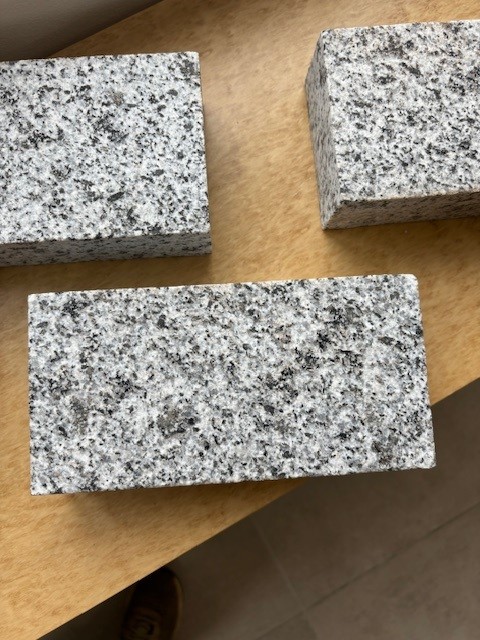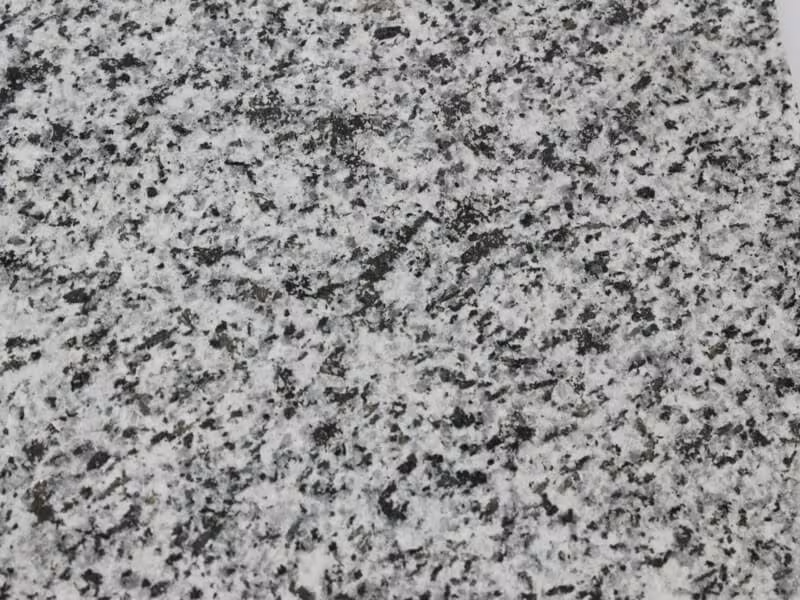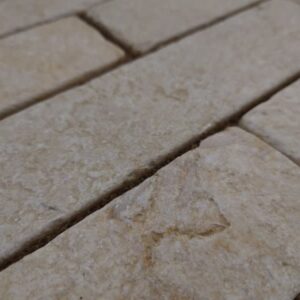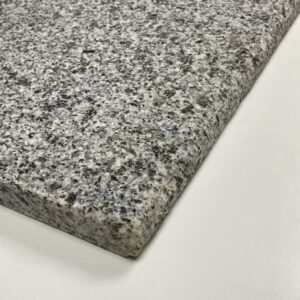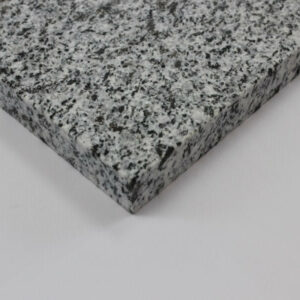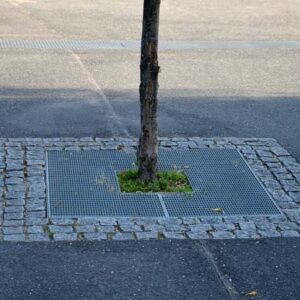Silver – Grey Sawn Granite Setts
£1.80 (ex. VAT)
Description
Our Silver-Grey Granite Setts come with a flamed texture surface with straight machine cut edges. This surface gives Granite Paving excellent anti-slip properties. Granite paving is an excellent choice for a modern contemporary look, whilst creating an extremely durable, hard-wearing surface.
Granite Paving Setts can work well as a decorative edge with most Porcelain Paving products, providing an attractive contrast in both colour and texture.
Available in:
200 x 100 x 50mm
100 x 100 x 50mm
Also Available in 900 x 600 x 20mm paving slabs
Do not use acidic cleaners on natural stone as they can cause permanent, irreparable, damage to the colour and structure of the stone.
Additional information
| Weight | 40 kg |
|---|
Please note the shade of the final product could differ slightly compared to the sample you may receive due to slight batch variation. You must ensure that you are happy with the colour variation of the product you have received before you start laying, as after installation exchange will no longer be possible.
Ensure that you have all the required material to completely the whole project onsite before commencing any work. Open all your crates at the same time, taking material evenly from each of them. This will ensure you have a good distribution of colours across the whole paved area. DO NOT open one crate at a time using all the material before opening the next, this can result in uneven distribution of colours and can look unsightly.
We recommend that all customers read our product selection, maintenance & installation guides before purchasing.
Please ensure that you lay Silver Grey Granite Paving with the Flamed (textured) side visible the flat (smooth) side is completely unfinished and is not a suitable finished surface.
In some batches of granite paving there will be slabs with vein lines visible on the surface of the stone. This is a natural phenomenon as is not a a fault with the paving, if you are not happy with these veined slabs do not lay them and you are welcome to bring them back to one of our branches for exchange.
Do not use acidic cleaners on natural stone as they can cause permanent, irreparable, damage to the colour and structure of the stone.
Where Are You Located?
We have branches across the South Coast of England, including Poole in Dorset, Winchester, Tadley, Romsey and Portsmouth in Hampshire. Internal showrooms are available to view in Poole and Portsmouth and external displays are available at Portsmouth, Poole, Winchester and Tadley.
Please visit our contact page for further information.
Are Granite Paving Slabs Slippery?
Granite paving is usually finished with a highly textured flamed surface, this makes them extremely slip-resistant and ideal for all outdoor applications. This rough surface makes them safe to walk in all weather conditions, as long as regular maintenance is carried out to remove dirt and debris from the surface of the paving. Please ensure that you lay Granite Paving with the Flamed side visible, the flat (smooth) side is completely unfinished and is not a suitable finished surface.
Is Granite Paving Good For Patios?
Granite paving is known for being long-lasting and resilient to heavy wear and tear. It’s extremely dense and hardwearing and makes the perfect paving materials for both classic and contemporary garden designs. It generally has a flamed surface finish that gives it excellent slip resistance properties making it ideally suited to the UK climate.
Do Granite Paving Slabs Need Sealing?
Yes, we would always recommend sealing Granite paving even though they are extremely dense and low maintenance. This will give some additional protection against hard to remove stains and also help to further reduce the maintenance needs of the product. It is advisable around swimming pools not to seal the stone as it is best to maintain the maximum porosity of the surround stone to improve slip resistance.
Always make sure your paving is completely dry before sealing and that you have at least 24 hours of dry weather ahead after sealing has been completed.
How To Clean Granite Paving Slabs?
Cleaning Granite paving is simple. It is a very dense stone needing less maintenance but regular cleaning will greatly help with slip resistance. Use soapy water and a stiff brush or, for tougher stains as well as moss and algae, we recommend using New Clean 60 available from our website. Leave on for around 60 minutes and wash off with a stiff brush or power washer to ensure you have removed all of the cleaner. For further reading please follow the link to our tech guide:
How To Lay Granite Paving Slabs?
You can lay Granite paving in the same way you would install any natural stone or porcelain paving products. Basically, they should be laid on a full wet bed of mortar over a compacted hardcore base, deep enough for the site conditions. For further reading please follow the link to our tech guide. Please ensure that you lay Granite Paving with the Flamed side visible. The flat (smooth) side is completely unfinished and is not a suitable finished surface.
We would additionally always recommend using a slurry primer when installing granite paving to help bond the slabs and the sub-base together. This will result in a greatly improved installation.
How Many Granite Setts In A Square Meter (M2)?
This really does depend on the size of setts you are using, but below is an approximate guide to the most popular products available in the UK currently.
Finished face 100mm x 100mm (varying depth) = 81 per sqm including a 10mm pointing gap
Finished face 200mm x 100mm (varying depth) = 43 per sqm including a 10mm pointing gap
What Are Granite Setts?
Setts are square or rectangular quarried stones most commonly made from Granite or Limestone that are cropped / cut into sizes ranging from 100mm to 300mm in depth and width. These have been used in a vast range of paving installations for centuries but most commonly are seen in driveways and road construction.
What Is The Difference Between Cobbles And Setts?
These terms are often confused but basically setts are square or rectangular quarried stones most commonly made from Granite or Limestone that are cropped / cut into sizes ranging from 100mm to 300mm in depth and width, these have been used in a vast range of paving installation for centuries.
Cobbles are quite often used to refer for something that is actually a sett, but the word cobble derives from the word cob which means a rounded lump. Cobbles and setts are both used traditionally in road construction, which could be where the confusion may arise, but the main difference is that setts are square and cobbles are round.
How To Lay Granite And Sandstone Setts?
In general setts are laid in a very similar way to normal paving slabs. You need to install a good base and then bed each of the setts individually into a full mortar bed. If being used for driveway you will need to increase the depth of the sub-base accordingly.
How To Point Granite Setts?
There are a few options when it comes to pointing setts the traditional way of using sand and cement mortar is still very popular and comprises mixing the sand and cement in a 4 to 1 ratio. This is then mixed to a wet but workable consistency, which is then pressed into the joints using a pointing trowel or Iron. This method is very time consuming and expensive due to the labour costs involved, which has resulted in alternative products for easier installation being developed.
A very good alternative to the traditional method is Flowpoint, which is a cement-based product used mainly by the civil engineering industry but is a far quicker method and offers superior frost resistance to mortar pointing. This product is mixed into a slurry and then poured into the joints, it then hardens within ten minutes and the excess can be brushed and hosed off. We recommend this product is used only by professional trades people as mistakes are very hard to rectify if used incorrectly.
Will My Purchased Products Match The Sample?
We always send a representative sample from the current batch of tiles or paving we have in stock, so as long as you requested a sample close to the time of purchasing, this will help to ensure the tiles and paving you receive matches the sample you have been sent as closely as possible.
All of our products are either natural or porcelain and therefore there is always scope for variation in shade, colour and to some extent the texture and finish with the natural products and with porcelain there will always be some slight colour variation between different batches, although the surface texture and finish will remain largely the same.
We would strongly recommend that you visit one of our showrooms or paving displays to look at the current selection, so you can be entirely sure of what you will receive.
Do I Need To Seal My Patio?
Yes, we recommend you seal all sandstone and natural stone paving upon (or shortly after) installation, to ensure it stays looking at it’s best for longest. Sealing will help make it resilient to staining and increases it’s longevity. We recommend Universeal Hydroseal or for an enhanced look Universeal Ultimate Stone Enhancer
Can I Come And Collect From You?
Yes. Our opening hours and address are found on the Contact Us page. We have fork-lift trucks for loading onto suitable vehicles at all sites, and staff are always available to help with loading of smaller items. We highly recommend that you call your local branch, before visiting, to confirm the items you wish to collect are available.
Specifications for Silver - Grey Sawn Granite Setts
| Colour | Silver / Grey |
| Finish | Natural Flamed / textured Surface |
| Material | Natural Granite |
| Needs Sealing | Yes |
| Suitable For | Outdoor |
| Slip Rating | R11 |
| Crate size | SOLD PER SQM |
| Thickness | 50mm |


